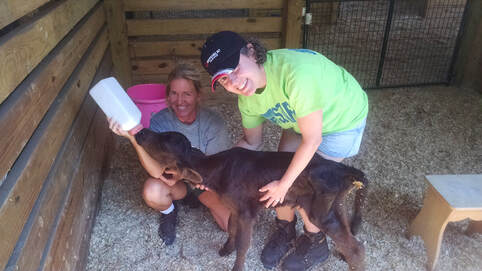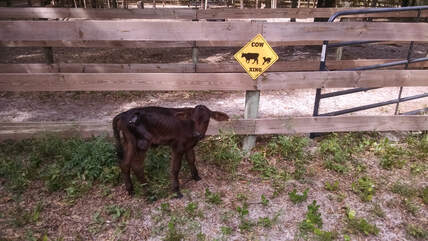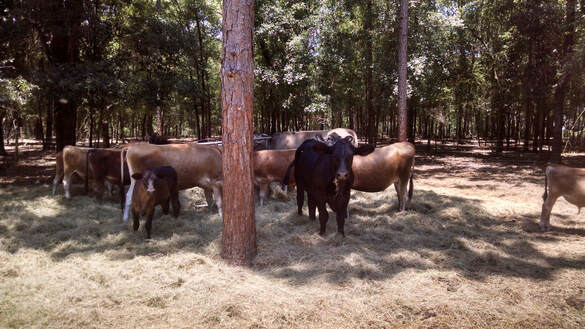One of the questions we are asked the most is, "What do you do with all of the calves?" When we started this whole thing, we didn't have a plan. I'd like to say we meticulously came up with a plan during an extended meeting on the subject, but that's not how it happened. We started out just wanting a milk cow, and of course, you can't just get one. She'd be lonely. After we completed the breeding of our first two heifers (another long story), Essie Lou and Daisy Mae, Bonnie Sue showed up. A friend of ours had her at their home in South Florida, and could no longer keep her. She arrived at the farm on Diane's Birthday, in MILK. That part is important to the story. Bonnie arrived several month's ahead of our "plan". To say we were not ready is an understatement and a whole other story. Not long after her arrival, we get a call from our neighbor, who is, along with many other things, a cattle rancher. He asked us to bring some warm milk from Bonnie in a calf bottle. Not asking any questions, we quickly warmed up some milk, put it in a calf bottle, and we raced down to his working pens in our Gator; a utility vehicle, not the reptile. Diane's sister was visiting from Colorado and came along for the ride. That, too, is a whole other story.
So, it turns out that our neighbor had a calf that was not nursing from her Mom. It appeared she had not nursed in days, and was very weak. We thought we were just bringing milk down for the calf. In fact, we were told to bring down the milk so he could show us how to nurse the calf. Knowing that we knew almost nothing about calves, and that we had two on the way, David decided it was a good opportunity to throw us in the deep end. He told us to take her home and do what we could for her. Trial by fire. We loaded her up in the back of the Gator and sped home. The next several days were spent struggling to get the calf, later to be named Anna Bell, or Annie, to nurse and recover. She taught us so much that week, about what to do with a calf, what not to do, and so much about ourselves.
So, it turns out that our neighbor had a calf that was not nursing from her Mom. It appeared she had not nursed in days, and was very weak. We thought we were just bringing milk down for the calf. In fact, we were told to bring down the milk so he could show us how to nurse the calf. Knowing that we knew almost nothing about calves, and that we had two on the way, David decided it was a good opportunity to throw us in the deep end. He told us to take her home and do what we could for her. Trial by fire. We loaded her up in the back of the Gator and sped home. The next several days were spent struggling to get the calf, later to be named Anna Bell, or Annie, to nurse and recover. She taught us so much that week, about what to do with a calf, what not to do, and so much about ourselves.

All that to say that Annie had a hard first few weeks. They say what doesn't kill you makes you strong and builds character. Well, she's a character. She also turned out to be an incredible teacher. We were her first students. We haven't graduated from her institute, but we are definitely taking the
advanced courses.
So, back to the question, "What do we do with our calves?" Our calves are first raised by their moms. Our goal is to keep each calf with their mom for as long as possible. There is a transition period, let's call it day care, where the calf goes to the nursery so that the mom has some time off, which allows her to roam the property with the herd during the day. Later, they start to spend the night with the other calves in the nursery, returning to their mom for nursing and bonding time. This process goes on throughout the calf's first several months. Along the way, they transition to the bottle, to build the bond with us humans.
advanced courses.
So, back to the question, "What do we do with our calves?" Our calves are first raised by their moms. Our goal is to keep each calf with their mom for as long as possible. There is a transition period, let's call it day care, where the calf goes to the nursery so that the mom has some time off, which allows her to roam the property with the herd during the day. Later, they start to spend the night with the other calves in the nursery, returning to their mom for nursing and bonding time. This process goes on throughout the calf's first several months. Along the way, they transition to the bottle, to build the bond with us humans.

The nursery, we later renamed Annie's Gentle Bull Academy, is run by Annie. In the nursery, she teaches the calves socialization, the ways of a cow, and most importantly, how to respect the humans. Annie loves us. I can say that with certainty, and she imparts that trait on to each calf, heifer, and bull under her care. If any calf gets out of line with us, Annie quickly corrects the unwanted behavior. If she is not readily available, she can be quickly called to the scene to handle the issue. As an example, when Missy was about a year old, she wanted to challenge me during feeding. Annie raced over, got under her, and began to toss her over the fence. I had to order her to put her down. Another time, in the dark, Missy was again giving me a hard time. As I scolded her, we both heard thunder headed our way. Missy did not realize what it was, but I did. I cleared the area as Annie rammed head first into Missy, rolling her like a bowling pin. Missy got the message and never caused a problem again.
So, you'll notice that Annie is black. She doesn't look like a dairy cow. At first she did not notice she was different until the other calves started showing up. We wanted her to always feel like she belongs, so we told her that she is a Nigerian Jersey. She's never questioned it.
Annie takes her responsibility very serious. She leads her group to pasture, and will bring them back in by simply calling for her across the 60 acres. She responds when called with a loud bellow, then you hear her calling in the calves. They line up and follow her in like the seven dwarfs. It is a sight to see.
Annie has turned out many well behaved cows and bulls. She also has an apprentice, who came to us a year after Annie from the same ranch. Perdy is also a Nigerian Jersey. Her mom had a hard delivery, and we were given the task of caring for the calf while David nursed her mom back to heath(which he did). Perdy was in bad shape when she arrived. She got stuck coming out, and had issues from that. Again, we learned alot from her. Perdy, who is now bigger than Annie, runs the nursery, while Annie cares for the bull calves and bulls in her academy.
So, the calves are raised by their moms, and by Nanny Annie, and by Nanny Perdy. All of our girl babies are still here. When they are ready, they move from the nursery to the main herd. All of the boys grow up to be bulls. Most of them are still here at the farm. A few have left to be bulls at other small farms.
Annie takes her responsibility very serious. She leads her group to pasture, and will bring them back in by simply calling for her across the 60 acres. She responds when called with a loud bellow, then you hear her calling in the calves. They line up and follow her in like the seven dwarfs. It is a sight to see.
Annie has turned out many well behaved cows and bulls. She also has an apprentice, who came to us a year after Annie from the same ranch. Perdy is also a Nigerian Jersey. Her mom had a hard delivery, and we were given the task of caring for the calf while David nursed her mom back to heath(which he did). Perdy was in bad shape when she arrived. She got stuck coming out, and had issues from that. Again, we learned alot from her. Perdy, who is now bigger than Annie, runs the nursery, while Annie cares for the bull calves and bulls in her academy.
So, the calves are raised by their moms, and by Nanny Annie, and by Nanny Perdy. All of our girl babies are still here. When they are ready, they move from the nursery to the main herd. All of the boys grow up to be bulls. Most of them are still here at the farm. A few have left to be bulls at other small farms.
Our Bulls
Jersey bulls are famous for being dangerous. We received warning after warning about keeping a bull on the property. What we found out, over time, is that the bulls raised by Annie are different. They are gentle. They can be led on a lead line. They come when called, and yes, they know their name. When they are needed to breed a cow, they can be led to a cow in heat, and more importantly, can be led away when it is time to go back to their turn out. Those that have left the farm continue with the same traits, being respectful to their humans, and gentle to their cows. There are a few ideas about the why and how, but mostly we think it is Annie, a cow who loves her people, and teaches her kind to do the same.
Jersey bulls are famous for being dangerous. We received warning after warning about keeping a bull on the property. What we found out, over time, is that the bulls raised by Annie are different. They are gentle. They can be led on a lead line. They come when called, and yes, they know their name. When they are needed to breed a cow, they can be led to a cow in heat, and more importantly, can be led away when it is time to go back to their turn out. Those that have left the farm continue with the same traits, being respectful to their humans, and gentle to their cows. There are a few ideas about the why and how, but mostly we think it is Annie, a cow who loves her people, and teaches her kind to do the same.
